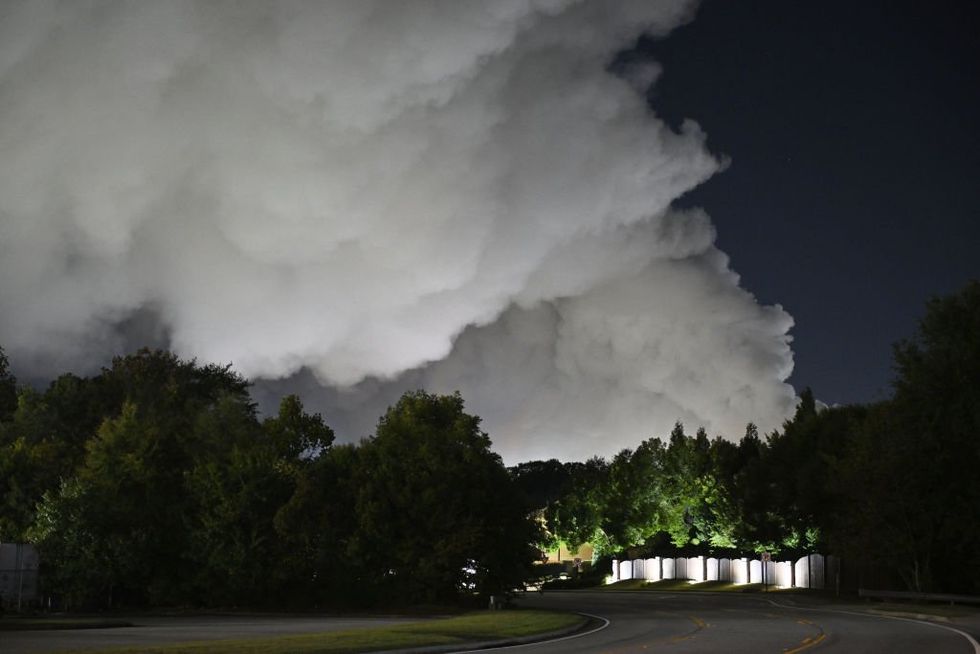Georgia chemical plant goes up in smoke once again, prompting evacuation
A chemical plant in Conyers, Georgia, quickly transformed into an inferno Sunday morning, darkening the sky above the city of roughly 17,000 with a chemical-laden plume and prompting the evacuation of its residents. The Rockdale County Emergency Management Agency announced Monday morning that the county remains closed and continues to advise residents to shelter in place, to turn off their air conditioning units, and to keep their windows and doors shut. According to surveys conducted by the Environmental Protection Division and the Environmental Protection Agency, chlorine "was detected in the air emitting from the incident location of BioLab," an apparent manufacturer of pool treatment products. It's presently unclear whether other potentially hazardous chemicals were thrown up over Conyers, which sits roughly 25 miles east of Atlanta. "You could feel the burning. You started feeling like you wanted to cough or throw up," Ruby Knauers, one of the evacuees told NBC News. Rockdale County Fire Chief Marian McDaniel indicated that around 5:30 a.m. on Sunday, there was a fire on the roof area of the chemical plant. The initial roof fire had apparently triggered the sprinkler system, which in turn set off a water-reactive chemical at the plant. While this fire was apparently "contained," another fire kicked off around noon as product from the building was being offloaded. The Atlanta Journal-Constitution reported that the giant plume of smoke was visible roughly 30 miles away at the Hartsfield-Jackson International Airport. Officials quickly implored locals to "CANCEL all church services for the day" and to avoid the affected area of town. While the Rockdale County Sheriff's Office initially advised locals to "remain indoors and keep windows closed to minimize exposure to any potential hazards," the RCSO announced later in the day that residents would be evacuated from affected areas. Chief McDaniel noted in an update that the fire was ultimately snuffed out around 4 p.m., but that the massive column of smoke resulting from the chemical reaction might remain visible for days. The roof and walls of the warehouse have since collapsed. This is not the first time that the BioLab facility in Conyers has made life difficult for locals. McDaniel noted further that this is the third incident of "this magnitude" to have occurred at the plant during the past seven years she has been with the fire department, reported the Journal-Constitution. 'Suffocation is the characteristic initial complaint of patient/victims exposed to chlorine.' On Sept. 14, 2020, a "thermal decomposition event" took place involving a product containing chlorine. According to the U.S. Chemical Safety and Hazard Investigation Board, there were no injuries reported, but smoke from the incident nevertheless shut down Interstate Highway 20. A similar fire, fueled by 250,000 pounds of dry chlorine pellets, started in May 2004 at the BioLab warehouse, again darkening Conyers with a chemical cloud. The UPI reported at the time that 40 people were treated in local hospitals for breathing problems and 30 firefighters were treated for heat exhaustion. BioLab's parent company agreed several years later to a settlement for the residents and businesses impacted by the incident. A CSB report concerning an Aug. 27, 2020, incident at a BioLab location in Westlake, Louisiana, indicated what appears to be at issue. Trichloroisocyanuric acid (TCCA), used as a sanitizer to kill algae and bacteria in large bodies of water, is stored in these warehouses. The report explained: When a TCCA-based formulation ... comes in contact with or is wetted/moistened by a small amount of water and does not dissolve, it can experience a chemical reaction, generating heat and causing the decomposition of the chemical, which in turn produces toxic chlorine gas and can produce explosive nitrogen trichloride. Chlorine gas was used as a chemical warfare agent to kill multitudes of men during World War I. The Centers for Disease Control and Prevention indicated that at low concentrations, chlorine gas can cause eye and nose irritation, sore throat and cough. At high exposure levels, the gas released by BioLab can cause "irritation of the upper respiratory tract and accumulation of fluid in the lungs (pulmonary edema) contribut[ing] to a sensation of choking." "Suffocation is the characteristic initial complaint of patient/victims exposed to chlorine. The majority of deaths occur within 24 hours and are due to respiratory failure," noted the CDC. KIK Consumer Products, BioLab's parent company, said in a statement Sunday, "We are actively responding to an occurrence at our facility in Conyers, Georgia. Our employees are accounted for with no injuries reported. Our team is on the scene, working with first responders and local authorities to assess and contain the situation. As always, the safety of our community remains our t


A chemical plant in Conyers, Georgia, quickly transformed into an inferno Sunday morning, darkening the sky above the city of roughly 17,000 with a chemical-laden plume and prompting the evacuation of its residents.
The Rockdale County Emergency Management Agency announced Monday morning that the county remains closed and continues to advise residents to shelter in place, to turn off their air conditioning units, and to keep their windows and doors shut.
According to surveys conducted by the Environmental Protection Division and the Environmental Protection Agency, chlorine "was detected in the air emitting from the incident location of BioLab," an apparent manufacturer of pool treatment products.
It's presently unclear whether other potentially hazardous chemicals were thrown up over Conyers, which sits roughly 25 miles east of Atlanta.
"You could feel the burning. You started feeling like you wanted to cough or throw up," Ruby Knauers, one of the evacuees told NBC News.
Rockdale County Fire Chief Marian McDaniel indicated that around 5:30 a.m. on Sunday, there was a fire on the roof area of the chemical plant. The initial roof fire had apparently triggered the sprinkler system, which in turn set off a water-reactive chemical at the plant.
While this fire was apparently "contained," another fire kicked off around noon as product from the building was being offloaded.
The Atlanta Journal-Constitution reported that the giant plume of smoke was visible roughly 30 miles away at the Hartsfield-Jackson International Airport.
Officials quickly implored locals to "CANCEL all church services for the day" and to avoid the affected area of town.
While the Rockdale County Sheriff's Office initially advised locals to "remain indoors and keep windows closed to minimize exposure to any potential hazards," the RCSO announced later in the day that residents would be evacuated from affected areas.
Chief McDaniel noted in an update that the fire was ultimately snuffed out around 4 p.m., but that the massive column of smoke resulting from the chemical reaction might remain visible for days. The roof and walls of the warehouse have since collapsed.
This is not the first time that the BioLab facility in Conyers has made life difficult for locals.
McDaniel noted further that this is the third incident of "this magnitude" to have occurred at the plant during the past seven years she has been with the fire department, reported the Journal-Constitution.
'Suffocation is the characteristic initial complaint of patient/victims exposed to chlorine.'
On Sept. 14, 2020, a "thermal decomposition event" took place involving a product containing chlorine. According to the U.S. Chemical Safety and Hazard Investigation Board, there were no injuries reported, but smoke from the incident nevertheless shut down Interstate Highway 20.
A similar fire, fueled by 250,000 pounds of dry chlorine pellets, started in May 2004 at the BioLab warehouse, again darkening Conyers with a chemical cloud.
The UPI reported at the time that 40 people were treated in local hospitals for breathing problems and 30 firefighters were treated for heat exhaustion. BioLab's parent company agreed several years later to a settlement for the residents and businesses impacted by the incident.
A CSB report concerning an Aug. 27, 2020, incident at a BioLab location in Westlake, Louisiana, indicated what appears to be at issue. Trichloroisocyanuric acid (TCCA), used as a sanitizer to kill algae and bacteria in large bodies of water, is stored in these warehouses. The report explained:
When a TCCA-based formulation ... comes in contact with or is wetted/moistened by a small amount of water and does not dissolve, it can experience a chemical reaction, generating heat and causing the decomposition of the chemical, which in turn produces toxic chlorine gas and can produce explosive nitrogen trichloride.
Chlorine gas was used as a chemical warfare agent to kill multitudes of men during World War I.
The Centers for Disease Control and Prevention indicated that at low concentrations, chlorine gas can cause eye and nose irritation, sore throat and cough. At high exposure levels, the gas released by BioLab can cause "irritation of the upper respiratory tract and accumulation of fluid in the lungs (pulmonary edema) contribut[ing] to a sensation of choking."
"Suffocation is the characteristic initial complaint of patient/victims exposed to chlorine. The majority of deaths occur within 24 hours and are due to respiratory failure," noted the CDC.
KIK Consumer Products, BioLab's parent company, said in a statement Sunday, "We are actively responding to an occurrence at our facility in Conyers, Georgia. Our employees are accounted for with no injuries reported. Our team is on the scene, working with first responders and local authorities to assess and contain the situation. As always, the safety of our community remains our top priority."
Like Blaze News? Bypass the censors, sign up for our newsletters, and get stories like this direct to your inbox. Sign up here!
Originally Published at Daily Wire, World Net Daily, or The Blaze
What's Your Reaction?
































































































